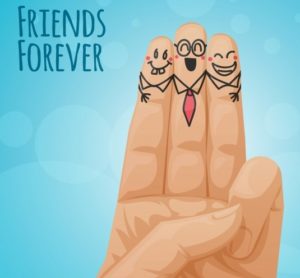
Problems, challenges and mostly life itself seems easier when there is a friend around.
We feel like we can solve, fix or just endure whatever life may have thrown at us, when we have a friend supporting us. And when things don’t go our way, friends help us bounce back and face life once more.
The ability to bounce back, or ‘resilience’ is a human tendency that allows us to keep living, even when we have had the most traumatic experiences in our lives. Life is full of ups and downs, some events more major then others, like the loss of a loved one or a natural disaster, and stressors that are more prolonged than others, like a major chronic illness or an abusive situation you can’t immediately get out of.
All of these are distressing and upsetting, but the human body and mind are built to endure and adapt to them to continue to lead happy healthy lives.
Resilience can be thought of as a muscle; we can build and strengthen it.
We have known for a while that having a strong support system is an important factor that contributes to how resilient you are. Having family and a community you can lean on has always been thought of as therapeutic. Cancer patients who had good community and family support showed greater chances of recovery, than those without.
Recent research however shows, that just one best friend is enough to build resilience in children. For the new study, Graber, working with Professor Rhiannon Turner from Queen’s University in Belfast and Professor Anna Madill from the University of Leeds, surveyed 409 students between the ages of 11 and 19 from three schools and two colleges in Yorkshire. The schools were in areas with poor socioeconomic status. Findings revealed a significant positive association between perceived friendship quality and resilience.
The researchers found that both boys’ and girls’ best friendships facilitated effective ways of coping — such as planning, reframing an issue in a positive way, and using emotional support — that helped them develop resilience to complex challenges.
In another research by Dr Graber, recruited 185 adults through online social networking sites, university events and community organisations supporting socially-isolated adults. Some 75 adults completed the questionnaire.
Participants completed assessments on psychological resilience, best friendship quality, coping behaviours and self-esteem. Participants then completed the same assessments one year later, to see how best friendship quality had impacted resilience processes over this period.
Findings revealed that best friendships are a protective mechanism
It supports the development of psychological resilience in adults, although the mechanisms for this relationship remain unclear. These findings support previous research by Dr Graber conducted on socio-economically vulnerable children.
So what does the research mean for us?
For one, friendships can make us physically active. Physical activity is linked to more happy hormones in our body, building positive emotions and lowering depressive symptoms. Physical activity is also linked to increased creativity, an important factor that contributes to resilience by helping us in problem-solving.
Good friends also provide emotional support, as well as helping us reframing the issue in a positive light, along with planning, all affective coping and hence resilience-building strategies.
Dr Garber says that communities and policymakers should look for ways to increase opportunities for adults to cultivate friendships—especially adults who are socially isolated, like caregivers or people with mental health problems.
Graber adds, you don’t not need to be a social butterfly. “My analysis shows that just one good quality friendship can make a difference to how you get through difficult times.”
NOTE: This article is by our Intern Shazia Ahmad.
